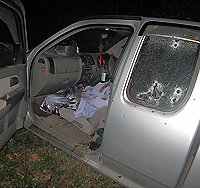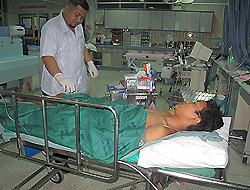Police fired tear gas and used flash-grenades to disperse hundreds of people after Saturday's peaceful 'Occupy Oakland' demonstration.

Members of the Oakland Police department form a line during a confrontation with Occupy Oakland demonstrators near the Oakland Museum of California in Oakland, California January 28, 2012. Police fired tear gas at hundreds of Occupy Oakland protesters who tried to occupy a shuttered convention center on Saturday, arresting 19 people in the latest clash between anti-Wall Street activists and authorities in the California city. REUTERS/Stephen Lam
Protesters gathered at a central plaza and then over 2,000 marched through the city streets planning to take over the vacant Henry Kaiser convention center. Occupy Oakland said last week that they planned to move into the building and turn it into a social center and political hub.
When the protesters started tearing down sections of the fence surrounding the vacant convention center, police issued a warning to disperse, and when protesters failed to do so, police officers went on to disperse them by force.
Late Saturday night, Oakland Mayor Jean Quan, who faced heavy criticism for the police action last autumn, called on the Occupy movement to "stop using Oakland as its playground."
* * *
UPDATE: This morning Occupy Oakland issued the following statement:
Oakland Police Violate Their Own Policies
Oakland, CA – Yesterday, the Oakland Police deployed hundreds of officers in riot gear so as to prevent Occupy Oakland from putting a vacant building to better use. This is a building which has sat vacant for 6 years, and the city has no current plans for it. The Occupy Oakland GA passed a proposal calling for the space to be turned into a social center, convergence center and headquarters of the Occupy Oakland movement.
With all the problems in our city, should preventing activists from putting a vacant building to better use be their highest priority? Was it worth the hundreds of thousands of dollars they spent?The police actions tonight cost the city of Oakland hundreds of thousands of dollars, and they repeatedly violated their own crowd control guidelines and protester’s civil rights.
With all the problems in our city, should preventing activists from putting a vacant building to better use be their highest priority? Was it worth the hundreds of thousands of dollars they spent?
The OPD is facing receivership based on actions by police in the past, and they have apparently learned nothing since October. On October 25, Occupiers rushed to the aid of Scott Olsen who was shot in the head by police, and the good Samaritans who rushed to his aid had a grenade thrown at them by police. At 3:30pm this afternoon, OO medics yet again ran to the aid of injured protesters lying on the ground. Other occupiers ran forward and used shields to protect the medic and injured man. The police then repeatedly fired less lethal rounds at these people trying to protect and help an injured man.
Around the same time, officers #419, #327, and others were swinging batons at protesters in a violation of OPD crowd control policy, which allows for pushing or jabbing with batons, but not the swinging of them.
In the evening, police illegally kettled and arrested hundreds of protesters. Police can give notices to disperse, if a group is engaged in illegal activity. However, if the group disperses and reassembles somewhere else, they are required to give another notice to disperse. Tonight, they kettled a march in progress, and arrested hundreds for refusing to disperse. Contrary to their own policy, the OPD gave no option of leaving or instruction on how to depart. These arrests are completely illegal, and this will probably result in another class action lawsuit against the OPD, who have already cost Oakland $58 million in lawsuits over the past 10 years.
OPD Crowd Control Policy: “If after a crowd disperses pursuant to a declaration of unlawful assembly and subsequently participants assemble at a different geographic location where the participants are engaged in non-violent and lawful First Amendment activity, such an assembly cannot be dispersed unless it has been determined that it is an unlawful assembly and the required official declaration has been adequately given.”
“The announcements shall also specify adequate egress or escape routes. Whenever possible, a minimum of two escape/egress routes shall be identified and announced.”
“When the only violation present is unlawful assembly, the crowd should be given an opportunity to disperse rather than face arrest.”
At least 4 journalists were arrested in this kettling. They include Susie Cagle, Kristen Hanes, Vivian Ho who were arrested and then released, and Gavin Aronsen who was taken to jail.
One woman was in terrible pain from the cuffs. Dozens of fellow arrestees shouted at the OPD to check her cuffs. But, contrary to their own policy, the OPD refused and simply threw her in a paddy wagon.
OPD Crowd Control Policy: “Officers should be cognizant that flex-cuffs may tighten when arrestees’ hands swell or move … When arrestees complain of pain from overly tight flex cuffs, members shall examine the cuffs to ensure proper fit”
“Through everything that has happened since September, from Occupy to the acceleration of “Bills” — NDAA, SOPA, PIPA, ACTA — never have I felt so helpless and enraged as I do tonight. These kids are heroes” -- Cathy Jones, attorney, National Lawyers GuildNumerous protesters were injured: some shot with “less lethal” rounds, some affected by tear gas, and some beaten by police batons. There are no totals yet for the numbers of protesters injured. One 19 year old woman was taken to the hospital with internal bleeding after she was beaten by Officer #119.
Cathy Jones, an attorney with the NLG gave the following statement to Occupy Oakland’s media team: “Through everything that has happened since September, from Occupy to the acceleration of “Bills” — NDAA, SOPA, PIPA, ACTA — never have I felt so helpless and enraged as I do tonight. These kids are heroes, and the rest of the country needs to open its collective eyes and grab what remains of its civil rights, because they are evaporating, quickly. Do you want to know what a police state looks like? Well, you sure as hell still do not know unless you were watching our citizen journalists.”
Today, Occupy Oakland events continue all day with a festival in Oscar Grant (Frank Ogawa) Plaza:
http://occupyoakland.org/2012/01/occupy-oakland-rise-up-festival-has-been-moved-to-oscar-grant-plaza-tomorrow/
Occupy Oakland is an emerging social movement without leaders or spokespersons. It is in solidarity with occupations currently occurring around the world in solidarity with Occupy Wall Street. Occupy Oakland Media is a committee of Occupy Oakland, established by the Occupy Oakland General Assembly.
CONTACT:
Occupy Oakland Media Committee
(510) 473-6250
media@occupyoakland.org
http://hellaoccupyoakland.org
* * *

Occupy Oakland demonstrators run over a fence in an attempt to escape from the police encirclement during a day-long protest in Oakland, California January 28, 2012. REUTERS/Stephen Lam
ABC news reports:
Kristin Hanes of ABC News San Francisco station KGO was one of several reporters briefly arrested.
“We were all walking down the same street and they kind of – they came at us from both sides, issued us a dispersal notice but there wasn’t really, you know, anywhere to go,” said Hanes.
“They kind of herded us all into this little area, pushed up to this building and I heard a bullhorn saying that you are being arrested and we are essentially surrounded, kind of pushed together like sardines here,” Hanes added.
Hanes was eventually released and de-handcuffed.
* * *

 (Photos by Abdulloh Benjakat)
(Photos by Abdulloh Benjakat)

















